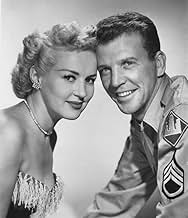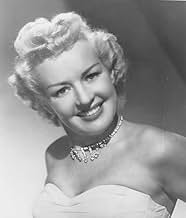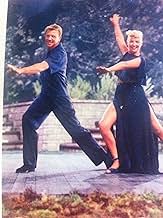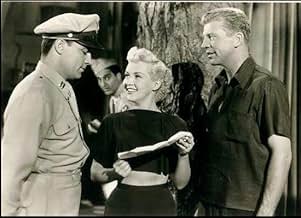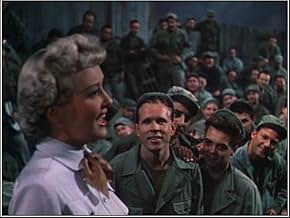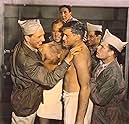A G.I. in occupied Japan tries to re-woo his old love, who's putting on a show for the troops.A G.I. in occupied Japan tries to re-woo his old love, who's putting on a show for the troops.A G.I. in occupied Japan tries to re-woo his old love, who's putting on a show for the troops.
- Awards
- 2 wins total
The Three Dunhills
- Speciality Act
- (as The Dunhills)
Yumin Akita
- Japanese Man
- (uncredited)
Richard Allan
- Stewart
- (uncredited)
Leon Alton
- Soldier
- (uncredited)
Gordon Armitage
- Soldier
- (uncredited)
Robert Bohannon
- Soldier
- (uncredited)
Tommy Bond
- Little Soldier
- (uncredited)
Featured reviews
So goes the first line of the title song of the 1946 hit Broadway revue on which this is (very loosely) based. 20th obviously couldn't film a revue, and a lot had happened in five years, so it whipped up a story and added some new songs to the Harold Rome score, most of which it discarded. As an adaptation it's a bust, but as an original movie musical it's pretty good. And what really makes it work, of all things, is Dan Dailey. As Betty Grable's still-in-love-with-her ex, he's much more of an actor than most hoofers, and his.yearning and longing provide an emotional center.it surely wouldn't have otherwise. Grable does her usual thing, nicely, with lots of legs, and Danny Thomas is saddled with some shabby material and a not-good song as The Ethnic Humor. The most thrilling, and unexpected, moment is surely "Going Home Train," a celebration of returning GIs led by, of all people, Bobby Short. The plot, such as it is, wraps up quickly and illogically, and Lloyd Bacon's best directorial days were long gone. But as a run-of-the-mill Fox musical with more emotional engagement than most, thanks to Dailey, I like it fine.
This was just about the last of the "putting on a show" musicals and even in 1951 it probably had rather an old fashioned look about it. It's nothing special, the music and sets are rather uninspired and the humor is dated but Betty Grable and Dan Dailey make a pleasant couple. Apparently they liked working together and it comes across in their dance numbers.
Highlights are Grable and Dailey's love duet and Bobby Short in the "Going Home Train" number.
Nice, nostalgic way to spend 90 minutes and the Grable legs have lost none of their lustre.
Highlights are Grable and Dailey's love duet and Bobby Short in the "Going Home Train" number.
Nice, nostalgic way to spend 90 minutes and the Grable legs have lost none of their lustre.
"Call Me Mister" is an interesting film on a number of counts. It's billed as a musical, in the form of a musical revue within a story. Betty Grable and Dan Dailey Star as Kay Hudson and Shep Dooley. He is a GI in occupied Japan sometime after the end of World War II, who tries to woo Kay. She is his old love from before the war who has arrived to organize entertainment shows for the soldiers.
The film is also interesting for something of the history that it shows. At the time it came out, the Korean War was being fought (June 25, 1950 - July 27, 1953). Grable's Hudson is in a uniform with a shoulder patch that reads "CAT." I had never heard of this before, but in checking it out I found that CAT stood for Civilian Actress Technician. The CATs were an entertainment program created during the Korean War for the U.S. Army. They would travel to Army posts outside the U.S., and organize, set up and direct entertainment using the GIs themselves.
The film has a screwy opening with dates. People are waiting in New York when at 7 p.m. on Aug. 14, 1945, Pres, Truman announces that Japan has surrendered. Then it switches immediately to Japan and American GIs marching at a replacement depot - the 4th Replacement Depot, Camp Zama, in Tokyo. While American occupation officially started with Japan's surrender, American units and servicemen began moving in and setting up house over the next few weeks. But, if the CATs weren't organized until the Korean War, then the setting of this film would be at least five years after the end of WW II.
The performance that the CATs organize is given in the Ernie Pyle theater. It was named after the famous and beloved WW II journalist who was killed near end of the war on a small island off Okinawa on April 18, 1945. Pyle won a Pulitzer Prize for his war reporting about individual GIs and their hometowns and families.
This is one of the few films in which the Dunhill Trio danced. Others in the cast include Dale Robertson, Richard Boone and Jeffrey Hunter. The film is okay but nothing special. The music and dance numbers take up just a small portion. The story itself and screenplay are just so-so.
Here are a couple of good lines.
Kay Hudson, "Well, captain, I'll be brief." Capt. Johnny Comstock, "Oh, please don't."
Stanley, played by Danny Thomas, "How do you like that. An American Greek copying Japanese numbers in English. Boy is this Army gonna be mixed up."
The film is also interesting for something of the history that it shows. At the time it came out, the Korean War was being fought (June 25, 1950 - July 27, 1953). Grable's Hudson is in a uniform with a shoulder patch that reads "CAT." I had never heard of this before, but in checking it out I found that CAT stood for Civilian Actress Technician. The CATs were an entertainment program created during the Korean War for the U.S. Army. They would travel to Army posts outside the U.S., and organize, set up and direct entertainment using the GIs themselves.
The film has a screwy opening with dates. People are waiting in New York when at 7 p.m. on Aug. 14, 1945, Pres, Truman announces that Japan has surrendered. Then it switches immediately to Japan and American GIs marching at a replacement depot - the 4th Replacement Depot, Camp Zama, in Tokyo. While American occupation officially started with Japan's surrender, American units and servicemen began moving in and setting up house over the next few weeks. But, if the CATs weren't organized until the Korean War, then the setting of this film would be at least five years after the end of WW II.
The performance that the CATs organize is given in the Ernie Pyle theater. It was named after the famous and beloved WW II journalist who was killed near end of the war on a small island off Okinawa on April 18, 1945. Pyle won a Pulitzer Prize for his war reporting about individual GIs and their hometowns and families.
This is one of the few films in which the Dunhill Trio danced. Others in the cast include Dale Robertson, Richard Boone and Jeffrey Hunter. The film is okay but nothing special. The music and dance numbers take up just a small portion. The story itself and screenplay are just so-so.
Here are a couple of good lines.
Kay Hudson, "Well, captain, I'll be brief." Capt. Johnny Comstock, "Oh, please don't."
Stanley, played by Danny Thomas, "How do you like that. An American Greek copying Japanese numbers in English. Boy is this Army gonna be mixed up."
LLoyd Bacon, the director of "Call me Mister", had an excellent track record as the man that gave us "42 Street", "Gold Diggers of 1936", "The Frisco Kid", and "Brother Orchid", among others. The film is based in a musical review with music by Harold Rome and Arnold Auerbach.
The plot is a vehicle to show Betty Grable in a musical about a USO performer in post war Japan. The story is just a pretext to present Ms. Grable as an entertainer who wants to share joy among the troops still awaiting repatriation. Ms. Grable had such an effervescence about herself, it's easy to fall under her spell even in such a silly comedy as this one.
Dan Dailey plays the man in Ms. Grable's life. He was an excellent singer and dancer who always projected a masculine presence in anything he did. Both Ms. Grable and Mr. Dailey make a winning combination in the movie.
We get to see other faces that went to make names for themselves. Dale Robertson, Danny Thomas, Richard Boone, Jeffrey Hunter, Frank Fontaine, Jerry Paris and Bobby Short, among others.
The musical numbers were staged by Busby Berkley, a man who always had an edge in everything he did. The last production number stands out as the four principals, Ms. Grable, Mr. Dailey, Ms. Venata and Mr. Thomas take to the stage.
That was entertainment!
The plot is a vehicle to show Betty Grable in a musical about a USO performer in post war Japan. The story is just a pretext to present Ms. Grable as an entertainer who wants to share joy among the troops still awaiting repatriation. Ms. Grable had such an effervescence about herself, it's easy to fall under her spell even in such a silly comedy as this one.
Dan Dailey plays the man in Ms. Grable's life. He was an excellent singer and dancer who always projected a masculine presence in anything he did. Both Ms. Grable and Mr. Dailey make a winning combination in the movie.
We get to see other faces that went to make names for themselves. Dale Robertson, Danny Thomas, Richard Boone, Jeffrey Hunter, Frank Fontaine, Jerry Paris and Bobby Short, among others.
The musical numbers were staged by Busby Berkley, a man who always had an edge in everything he did. The last production number stands out as the four principals, Ms. Grable, Mr. Dailey, Ms. Venata and Mr. Thomas take to the stage.
That was entertainment!
Screen-version of the Broadway musical revue from 1946 reconfigured as a Betty Grable vehicle by Fox, who saddled their star with a dull roster of leading men. She's a stage performer from the Great White Way who is currently performing in Tokyo with the Army-sponsored show "The Cats" and dodging ladies' man Dan Dailey, whom we first see trying to sell his tap shoes (!). She hears about volunteers needed for entertainment in Kyoto and beats it out of town with her gal-pal, only to run into military red tape when requesting 40 talented enlisted men to perform in her show and help move scenery. We never see Grable's Kay Hudson conceive her elaborate revue titled "Call Me Mister"--she seems to have it all worked out in her head--but the audition sequence with the soldiers is a lot of fun. Unfortunately, there's also Danny Thomas as a dishwashing private who's anxious to get in on the act and date Kay, but she gives him the brush-off when Dailey reappears (and if there was ever an also-ran, it's Danny Thomas). Dailey's Sgt. Dooley puts his dancing shoes back on for Kay's show thinking he's AWOL (he's really not, but don't ask why)--plus, it turns out he's really Kay's husband (ah, that's why he spends the night in her quarters!). And then there's dimply Dale Robertson as a captain who proposes marriage to Kay...and Richard Boone as a disgruntled mess sergeant...and Benay Venuta as Kay's girlfriend, who pushes Thomas out on stage unexpectedly to do a comedy routine that has the on-screen audience in stitches. None of it makes any sense, and screenwriters Albert E. Lewin and Burt Styler wouldn't know a funny line if they tripped over one, but the tap dancing sequences staged by Busby Berkeley are lively and the final number, "Love is Back in Business" composed by Sammy Fain and Mack Gordon, provides a colorful send-off. ** from ****
Did you know
- TriviaIn this musical, director Lloyd Bacon and dance director Busby Berkeley worked together for the first time since 42ème rue (1933).
- GoofsShep Dooley hops a ride on a rickshaw to reach his military base and passes a stonewall flower garden. Several hours and a very tired rickshaw runner later, he reaches his destination, and we pass the very same flower garden.
- Quotes
Kay Hudson: Well, captain, I'll be brief.
Capt.Johnny Comstock: Oh, please don't.
Details
- Release date
- Country of origin
- Language
- Also known as
- Kalla mej älskling
- Filming locations
- Production company
- See more company credits at IMDbPro
Box office
- Budget
- $1,900,000 (estimated)
- Runtime1 hour 36 minutes
- Aspect ratio
- 1.37 : 1
Contribute to this page
Suggest an edit or add missing content



